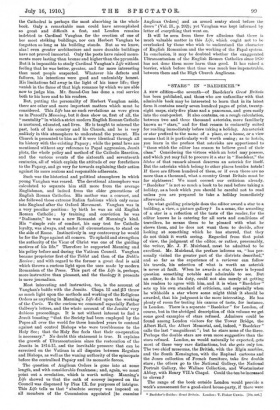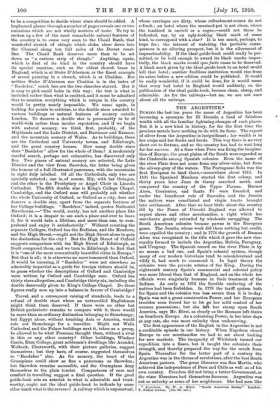" STARS " IN " BAEDEICER."*
A NEW edition—the seventh—of Baedeker's Great Britain has been published, and those who are unfamiliar with that admirable book may be interested to learn that in its latest form it contains nearly seven hundred pages of print, twenty- eight maps, sixty-five plans and a panorama, and goes easily into the coat-pocket. It also contains, on a rough calculation, between two and three thousand asterisks, more familiarly known as " stars," and for that reason is eminently suited for reading immediately before taking a holiday. An asterisk or star prefixed to the name of a place, or a house, or a view means that it is particularly well worth seeing ; as to hotels, you learn in the preface that asterisks are apportioned to " those which the editor has reason to believe good of their class." Considering the virtues which an hotel may possess, and which yet may fail to procure it a star in " Baedeker," the litotes of that remark almost deserves an asterisk for itself. But the asterisks which belong to other places besides hotels ! If there are fifteen hundred of them, or if even there are no more than a thousand, what a country Great Britain must be for sightseers ! We must correct our criticism already. " Baedeker " is not so much a book to be read before taking a holiday, as a book which you should be careful not to read unless you are prepared to take a holiday immediately afterwards.
On what guiding principle does the editor award a star to a building, a view, a picture gallery P In a sense, the awarding of a star is a reflection of the taste of the reader, for the editor knows he is catering for all sorts and conditions of travellers, he means them to be pleased with what he shows them, and he does not want them to decide, after looking at something which he has starred, that they do not think it worth seeing. Regarded from that point of view, the judgment of the editor, or rather, presumably, the writer, Mr. J. F. Muirhead, must be admitted to be excellent. Mr. Muirhead, the preface informs us, " has per- sonally visited the greater part of the districts described," and so far as the experience of a reviewer can follow his travels, his selection of what is worth an asterisk is never at fault. When he awards a star, there is beyond question something notable and admirable to see. But an editor, to do his duty, could not aim merely at getting his readers to agree with him, and it is when "Baedeker " sets up his own standard of criticism, and especially when he withholds a star where some might think it should be awarded, that his judgment is the more interesting. He has plenty of room for testing his canons of taste, for instance, in London. There is a separate " Baedeker" for London, of course, but in the abridged description of this volume we get some good examples of stars refused. Admirers could be found among London visitors for the Tower Bridge, the Albert Hall, the Albert Memorial, and, indeed, " Baedeker " calls the last " magnificent "; but he stars none of the three. Perhaps the double stars are even more suggestive than the stars refused. London, as would naturally be expected, gets most of these very rare distinctions, but she gets only ten. The two chief museums, the British, with the Elgin marbles, and the South Xensington, with the Raphael cartoons and the Jones collection of French furniture, take five double stars ; the others go to. the National Gallery, the National Portrait Gallery, the Wallace Collection, and Westminster Abbey, with Henry VIL's ChapeL Could the ten be increased to eleven P The range of the book outside London would provide a week's amusement for a good-sized house•party, if there were • Baedeker's Guides : Great Britain. London : T. Fisher Unwin. [10a. net.] to be a competition to decide where stars should be added. A haphazard glance through a number of pages reveals one or two omissions which are not wholly matters of taste. To try to reckon up a few of the most remarkable natural features of the country is to come very soon to the Chesil Bank, that wonderful stretch of shingle which slides sheer down into the Channel along ten full miles of the Dorset coast- line. The Chesil Bank deserves more than to be set down as " a curious strip of shingle." Anything, again, which is first of its kind in the country should have its special mention, such as the oldest church brass in England, which is at Stoke D'Abernon, or the finest example of mural painting in a church, which is at Chaldon. But neither Stoke D'Abernon nor Chaldon is in the index of " Baedeker," much less are the two churches starred. But it is easy to pick small holes in this way ; the test is what is included rather than what is omitted, and it must be admitted that to mention everything which is unique in the country would be pretty nearly impossible. We come again, in looking for points to criticise, to the double stars awarded to various buildings or natural features of scenery outside London. To deserve a double star is presumably to be of world-wide rather than insular reputation, and if we begin with natural scenery, we think first, probably, of the Highlands and the Lake District, and Dartmoor and Exmoor, and the mountain scenery of Wales. As to buildings, there are the Cathedral and University towns, and Edinburgh, and the great country houses. How many double stars does "Baedeker" allow for the whole of them? A moderately careful search, perhaps not exhaustive, has discovered only five. Two pieces of natural scenery are selected, the Lake District and the view from Snowdon, the latter being given the honour of a full illustrated panorama, with the mountains in sight duly labelled. Of all the Cathedrals, only two are specially selected ; one is, of course, Ely, with her Octagon, and the other is the Presbytery or Angel Choir in Lincoln Cathedral. The fifth double star is King's College Chapel, Cambridge, and the Oxford man will probably ask whether the whole University of Oxford, or Oxford as a city, does not deserve a double star, apart from the separate features of her College buildings. " Baedeker," indeed, quotes Nathaniel Hawthorne :—" The world, surely, has not another place like Oxford ; it is a despair to see such a place and ever to leave it, for it would take a lifetime, and more than one, to com- prehend and enjoy it satisfactorily." Without counting the separate Colleges, Oxford has the Bodleian, and the Meadows, and the High Street,—ought not the High Street alone to gain the distinction for the city ? But the High Street of Oxford suggests comparison with the High Street of Edinburgh, as Scott compared them, and we turn to Edinburgh to find that it is "one of the most romantically beautiful cities in Europe." But that is all; it is otherwise no more honoured than Oxford. It would be amusing, if " Baedeker " were not elsewhere as admirably impartial as a guide for foreign visitors should be, to guess whether the descriptions of Oxford and Cambridge were written by Oxford and Cambridge men. Oxford has thirty stars altogether, and Cambridge thirty-six, including the double deservedly given to King's College Chapel. Do those figures really sum up into a balance in favour of Cambridge ?
Travel, and a consequent raising of standards, leads to a refusal of double stars where an untravelled Englishman might think them deserved. If there were no other but British prehistoric remains to compare with it, there would be more than an ordinary.distinction belonging to Stonehenge ; but Egypt alone, without touching Asia or America, would rule out Stonehenge for a traveller. Might not Wells Cathedral and the Palace buildings next it, taken as a group, be allowed to be what Freeman thought them, without a rival in this or any other country P Other buildings, Windsor Castle, Eton College, great noblemen's dwellings like Arundel, Welbeck, Chatsworth, with their picture galleries, suggest themselves ; but they have, of coarse, suggested themselves to "Baedeker" also. As for scenery, the heart of the Grampians could show as fine a panorama as Snowdon ; but Snowdon remains accessible, and the Grampians deny themselves to the plain tourist. Comparisons of ease and comfort in travelling suggest a final question. If the good guide-book sets an asterisk to what is admirable and trust- worthy, ought not the ideal guide-book to indicate by some other mark what is the reverse F A railway which is unpunotual,
whose carriages are dirty, whose refreshment-rooms do not refresh ; an hotel where the mustard-pot is not clean, where the landlord is uncivil or a rogue,—could not these be indicated, say, by an ugly-looking black mark of some kind, to correspond with a star? It is too much, perhaps, to hope for ; the interest of watching the probable conse- quences is an alluring prospect, but it is the allurement of impracticability. If the ideal guide-book could really be per- mitted, or be bold enough to award its black marks impar- tially, the black marks would ipso facto cease to be deserved. A black mark given by the ideal guide-book to an hotel would kill that hotel ; another faultless institution would rise from its ashes before a new edition could be published. It would be really wonderful, if it could be done, for it would mean that every bad hotel in England would suddenly, on the publication of the ideal guide-book, become clean, cheap, and admirable. As for the railways—but no, we are not sure about all the railways.







































 Previous page
Previous page